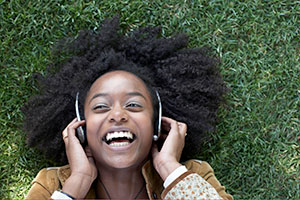Parents loud and clear: Test teens and tweens for hearing loss, too


Parents loud and clear: Test teens and tweens for hearing loss, too
Good hearing is essential in so many ways—for speech and language development in early childhood, and for learning and social interactions throughout life. In the last 10 years, hearing screening has been widely implemented for newborns.
Screening in preschool and elementary school-age children is routine in many states. School-based hearing screening is effective at identifying children with hearing loss that has the potential to impact communication, so that the children may receive treatment before they experience delays in speech, language, and learning. In contrast, hearing screening for tweens (9-11 years old) and teens is uncommon. Yet, children in these age groups may experience hearing loss from extended listening to loud noise, such as through personal, portable listening devices like MP3 players.
In this National Poll on Children’s Health, we asked parents of children age 0-17 about support for hearing screening at various ages, and where they would prefer to have the screening done.
Strong Support for Hearing Screening
Across the U.S., parents are strongly in favor of required hearing screenings for children at all ages. Two-thirds or more of parents support hearing screening overall. Levels of support vary from 67% for age 16-17 years to as high as 82% for age 6-7 years (Figure 1).
Parents are more likely to prefer the primary care office for the hearing screening in preschoolers and 6- to 7-year-olds, and they prefer a school-based screening for older children. The most common preferred locations for hearing screening by age are:
- 2-3 years: 67% in primary care offices
- 6-7 years: 46% in primary care offices; 41% in schools
- 10-11 years: 49% in schools; 38% in primary care offices
- 16-17 years: 49% in schools; 37% in primary care offices
About 10% of parents indicated a preference for an audiology or ear-nose-throat specialist office for screening of children of all ages, which may reflect the small number of parents who have had experience with hearing loss in their children.

Highlights
- A majority of parents favor requiring regular hearing screenings for children from preschool through teenage years.
- For preschool-age children, two-thirds of parents prefer primary care offices for hearing screening.
- About half of parents prefer that hearing screening for older children take place in schools.
Implications
Screening for hearing loss among newborn infants is common across the country, but screening for older children varies by state. In this latest Poll, parents indicate a very strong level of support for hearing screening among children at all ages.
Remarkably, there is similar enthusiasm for hearing screening for teenagers as for preschoolers. This is a somewhat surprising finding, as hearing loss occurring in young children prior to language development can cause more noticeable problems with speech and learning than later-onset hearing loss. Parents of teens may have an increasing awareness of the risk of hearing loss due to noise exposure associated with headphones/earbuds and personal, personal audio devices (addressed in a previous Poll).
In a time when many states are struggling with financial difficulties, hearing screening may not rise to the top of the priority list. Hearing loss is an invisible disability, and does not result in hospitalization if untreated—rather, the costs can be social, emotional, and educational.
The preferences of parents, measured in this Poll, are an indication of strong support for a more comprehensive approach to hearing screening among older children, largely based in school settings. These results also suggest that primary care offices may expect many requests for performing hearing screens among tweens and teens, which may require practices to partner with audiologists and otolaryngologists and/or invest in additional equipment and training.

Data Source & Methods
This report presents findings from a nationally representative household survey conducted exclusively by GfK Custom Research, LLC (GfK), for C.S. Mott Children’s Hospital via a method used in many published studies. The survey was administered in May 2012 to a randomly selected, stratified group of parents with a child age 0-17 (n=1,539) from GfK’s web-enabled KnowledgePanel® that closely resembles the U.S. population. The sample was subsequently weighted to reflect population figures from the Census Bureau. The survey completion rate was 55% among panel members contacted to participate. The margin of error is ± 2 to 4 percentage points.
Findings from the C.S. Mott Children's Hospital National Poll on Children's Health do not represent the opinions of the investigators or the opinions of the University of Michigan. The University of Michigan reserves all rights over this material.
This study was supported in part by a grant from the American Society of Pediatric Otolaryngology and the American Academy of Otolaryngology-Head and Neck Surgery Foundation.
Citation
Davis MM, Lesperance M, Handelsman J, Kauffman AD, Singer DC, Gebremariam A, Clark SJ. Parents loud and clear: Test teens and tweens for hearing loss, too. C.S. Mott Children's Hospital National Poll on Children's Health, University of Michigan. Vol 17, Issue 2, December 2012. Available at: http://mottpoll.org/reports-surveys/parents-loud-and-clear-test-teens-and-tweens-hearing-loss-too.


